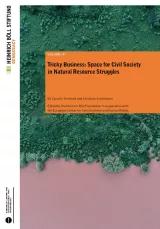Tricky Business: Space for Civil Society in Natural Resource Struggles
Governments and national as well as corporations are driving the demand for water, land, fossil fuels, raw materials, and organic resources of all kinds, as never before. Previously intact ecosystems are being sacrificed to satisfy this hunger for resources. Thousands of people are losing their livelihoods as a consequence. But citizens, organized civil society, and affected communities worldwide are pushing back against these developments. They are fighting for their rights and working to preserve their livelihoods. However, their protests are increasingly being met with repression, harassment, and defamation.
The fact that the rights of civil society are being curtailed worldwide is, unfortunately, not a new finding, but the current scale and scope are new and dramatic. Therefore in this study the Heinrich Böll Foundation and the European Center for Constitutional and Human Rights want to show how the mechanisms of expropriation and the undermining of human rights work. For that the authors Carolijn Terwindt and Christian Schliemann traveled to India, South Africa, Mexico, and the Philippines to study projects and talk to civil society activists and organizations on the ground. The resulting analysis provides us with insights on how we can better address and monitor resource and environmental policy projects.
- Listen to our podcast here.
- Read the summary of the study here.
- Read the preface of study here.
- Press release on Human Rights Day, December 10, 2017
Heinrich Böll Foundation and the European Center for Constitutional and Human Rights (ECCHR)
Product details
Table of contents
Foreword
Acknowledgments
Executive Summary
Introduction
PART 1: SETTING THE SCENE
1 Research design and methodology
1.1 Main research questions
1.2 Selection of countries
1.3 Research methods
2 Development of natural resources and participation of civil society
2.1 The design of natural resource development
2.2 Shrinking space for civil society engagement
PART 2: COUNTRY COMPARISON OF CLAIMS TO NATURAL RESOURCES – INDUSTRY, CONTESTATION, SHRINKING SPACE
3 Indian forests: Enter companies exit forest dwellers
3.1 India's economic turn since 1991
3.2 Odisha: Rich in minerals and indigenous peoples living on top of them
3.3 The standard: Consent from all forest dwellers is needed for extraction projects
4 Mexico's energy: A tale of threats, intimidation, and dispossession of indigenous peoples
4.1 Opening the Mexican market to foreign investment
4.2 Renewable energy and the arrival of wind parks in Oaxaca
4.3 Lack or inadequacy of consultations in many of the wind parks
5 Philippine plantations: Landed farmers or landless workers
5.1 The Philippine's political economy of land
5.2 Mindanao's agricultural path to development – large-scale plantations
5.3 Frustrating land reform in practice
6 South Africa: Metals more precious than men and women
6.1 General policies: Harmonizing the mining industry and rural (black) development
6.2 Conflicts about platinum extraction in Limpopo
6.3 Privatized consultations do not guarantee respect for local aspirations for development
PART 3: PRESSURES ON CIVIL SOCIETY AND EXISTING RESPONSE STRATEGIES
7 Patterns of restrictions: Pressures on civil society are shaped by the different stages in natural resource development projects
7.1 Lack of knowledge on the arrival and nature of a project
7.2 Approval of licenses and project implementation despite criticism
7.3 Public protests and direct action due to lack of influence in official spaces
7.4 Escalation: Physical harassment and targeted killings
8 Designing strategies to defend and reclaim space
8.1 Assessing and designing strategies
8.2 The inherent limits of defensive measures
8.3 Challenges to proactive and long-term responses
8.4 Structural change: Consultations, business, and the law
PART 4: CHANGING STRUCTURES – ENABLING PARTICIPATION
9 Tackling the root causes of restrictions: Enabling meaningful consultations and community consent
9.1 Consultations as conflict-solving and rights-protecting tools
9.2 «Prior» also means participation in elaborating (inter)national standards
9.3 The format of consultations should enable community participation
9.4 Enabling communities to be a strong negotiation partner
9.5 Accepting the consequences of community consultations
10 The role of business
10.1 Company involvement in the pressures faced by project critics
10.2 Expectations vis-à-vis companies
10.3 Making corporations live up to their responsibilities
11 Using legal means to protect and create civic space in the natural resource arena
11.1 The role of the judiciary in safeguarding civic space in the natural resource arena
11.2 How civil society can make better use of law to protect and create space in the natural resource arena
11.3 Defending against abuse of criminal law: Counterstrategies to criminalization
11.4 The inherent limits of judicial proceedings: The challenge of implementation for court orders
12 Lessons learned
Appendix
Bibliography
The Editors
Abbreviations
